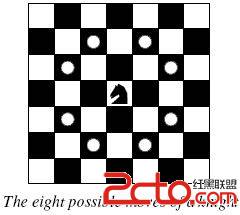A Knight's Journey
Time Limit: 1000MS Memory Limit: 65536K
Total Submissions: 23108 Accepted: 7819 Description
Background
The knight is getting bored of seeing the same black and white squares again and again and has decided to make a journey
around the world. Whenever a knight moves, it is two squares in one direction and one square perpendicular to this. The world of a knight is the chessboard he is living on. Our knight lives on a chessboard that has a smaller area than a regular 8 * 8 board, but it is still rectangular. Can you help this adventurous knight to make travel plans?
Problem
Find a path such that the knight visits every square once. The knight can start and end on any square of the board.
Input
The input begins with a positive integer n in the first line. The following lines contain n test cases. Each test case consists of a single line with two positive integers p and q, such that 1 <= p * q <= 26. This represents a p * q chessboard, where p describes how many different square numbers 1, . . . , p exist, q describes how many different square letters exist. These are the first q letters of the Latin alphabet: A, . . .
Output
The output for every scenario begins with a line containing "Scenario #i:", where i is the number of the scenario starting at 1. Then print a single line containing the lexicographically first path that visits all squares of the chessboard with knight moves followed by an empty line. The path should be given on a single line by concatenating the names of the visited squares. Each square name consists of a capital letter followed by a number.
If no such path exist, you should output impossible on a single line.
Sample Input
3
1 1
2 3
4 3
Sample Output
Scenario #1:
A1
Scenario #2:
impossible
Scenario #3:
A1B3C1A2B4C2A3B1C3A4B2C4
Source
TUD Programming Contest 2005, Darmstadt, Germany
讀懂了題目這題就會做了,以前的馬在跳的時候都是在線上,這個題是這方格內還真有些不適應,轉化成在線上就好
[cpp]
#include <stdio.h>
#include <string.h>
int status[100][100],s;
int vex[]={-2,-2,2,2,-1,-1,1,1};
int vey[]={-1,1,-1,1,-2,2,-2,2};
char path1[1000],prepath1[1000];
int path2[1000],prepath2[1000],top,n,m,key,k;
int main()
{
void dfs(int x,int y);
int i,j,t,tem;
scanf("%d",&t);
tem=1;
while(t--)
{
scanf("%d %d",&n,&m);
memset(status,0,sizeof(status));
if(n==1&&m==1)
{
printf("Scenario #%d:\n",tem); tem++;
printf("A1\n");
printf("\n");
continue;
}
for(i=1;i<=n;i++)
{
for(j=1;j<=m;j++)
{
top=0;s=1;
memset(status,0,sizeof(status));
prepath1[top]='A'+j-1;
prepath2[top++]=i;
status[i][j]=1;
key=0; k=0;
dfs(i,j);
if(k==1)
{
break;
}
}
if(j!=m+1)
{
break;
}
}
printf("Scenario #%d:\n",tem); tem++;
if(i!=n+1)
{
for(i=0;i<=n*m-1;i++)
{
printf("%c%d",path1[i],path2[i]);
}
printf("\n");
}else
{
printf("impossible\n");
}
printf("\n");
}
return 0;
}
void dfs(int x,int y)
{
int i,j,xend,yend,change;
for(i=0;i<=7;i++)
{
xend=x+vex[i]; yend=y+vey[i];
if(xend>=1&&xend<=n&¥d>=1&¥d<=m&&!status[xend][yend])
{
s++;
prepath1[top]=yend+'A'-1;
prepath2[top++]=xend;
status[xend][yend]=1;
if(s==n*m)
{
k=1;
if(key==0)
{
for(j=0;j<=n*m-1;j++)
{
path1[j]=prepath1[j];
path2[j]=prepath2[j];
}
key=1;
}else
{
change=-1;
for(j=0;j<=n*m-1;j++)
{
if(path1[j]>prepath1[j])
{
change=1;
break;
}else if(path1[j]<prepath1[j])
{
change=0;
break;
}else
{
if(path2[j]>prepath2[j])
{
change=1;
break;
}else if(path2[j]<prepath2[j])
{
change=0;
break;
}
}
}
if(change==1)
{
for(j=0;j<=n*m-1;j++)
{
path1[j]=prepath1[j];
path2[j]=prepath2[j];
}
}
}
}else
{
dfs(xend,yend);
}
s--; top--;
status[xend][yend]=0;
}
}
}
Description
Background
The knight is getting bored of seeing the same black and white squares again and again and has decided to make a journey
around the world. Whenever a knight moves, it is two squares in one direction and one square perpendicular to this. The world of a knight is the chessboard he is living on. Our knight lives on a chessboard that has a smaller area than a regular 8 * 8 board, but it is still rectangular. Can you help this adventurous knight to make travel plans?
Problem
Find a path such that the knight visits every square once. The knight can start and end on any square of the board.
Input
The input begins with a positive integer n in the first line. The following lines contain n test cases. Each test case consists of a single line with two positive integers p and q, such that 1 <= p * q <= 26. This represents a p * q chessboard, where p describes how many different square numbers 1, . . . , p exist, q describes how many different square letters exist. These are the first q letters of the Latin alphabet: A, . . .
Output
The output for every scenario begins with a line containing "Scenario #i:", where i is the number of the scenario starting at 1. Then print a single line containing the lexicographically first path that visits all squares of the chessboard with knight moves followed by an empty line. The path should be given on a single line by concatenating the names of the visited squares. Each square name consists of a capital letter followed by a number.
If no such path exist, you should output impossible on a single line.
Sample Input
3
1 1
2 3
4 3
Sample Output
Scenario #1:
A1
Scenario #2:
impossible
Scenario #3:
A1B3C1A2B4C2A3B1C3A4B2C4
Source
TUD Programming Contest 2005, Darmstadt, Germany
讀懂了題目這題就會做了,以前的馬在跳的時候都是在線上,這個題是這方格內還真有些不適應,轉化成在線上就好
[cpp]
#include <stdio.h>
#include <string.h>
int status[100][100],s;
int vex[]={-2,-2,2,2,-1,-1,1,1};
int vey[]={-1,1,-1,1,-2,2,-2,2};
char path1[1000],prepath1[1000];
int path2[1000],prepath2[1000],top,n,m,key,k;
int main()
{
void dfs(int x,int y);
int i,j,t,tem;
scanf("%d",&t);
tem=1;
while(t--)
{
scanf("%d %d",&n,&m);
memset(status,0,sizeof(status));
if(n==1&&m==1)
{
printf("Scenario #%d:\n",tem); tem++;
printf("A1\n");
printf("\n");
continue;
}
for(i=1;i<=n;i++)
{
for(j=1;j<=m;j++)
{
top=0;s=1;
memset(status,0,sizeof(status));
prepath1[top]='A'+j-1;
prepath2[top++]=i;
status[i][j]=1;
key=0; k=0;
dfs(i,j);
if(k==1)
{
break;
}
}
if(j!=m+1)
{
break;
}
}
printf("Scenario #%d:\n",tem); tem++;
if(i!=n+1)
{
for(i=0;i<=n*m-1;i++)
{
printf("%c%d",path1[i],path2[i]);
}
printf("\n");
}else
{
printf("impossible\n");
}
printf("\n");
}
return 0;
}
void dfs(int x,int y)
{
int i,j,xend,yend,change;
for(i=0;i<=7;i++)
{
xend=x+vex[i]; yend=y+vey[i];
if(xend>=1&&xend<=n&¥d>=1&¥d<=m&&!status[xend][yend])
{
s++;
prepath1[top]=yend+'A'-1;
prepath2[top++]=xend;
status[xend][yend]=1;
if(s==n*m)
{
k=1;
if(key==0)
{
for(j=0;j<=n*m-1;j++)
{
path1[j]=prepath1[j];
path2[j]=prepath2[j];
}
key=1;
}else
{
change=-1;
for(j=0;j<=n*m-1;j++)
{
if(path1[j]>prepath1[j])
{
change=1;
break;
}else if(path1[j]<prepath1[j])
{
change=0;
break;
}else
{
if(path2[j]>prepath2[j])
{
change=1;
break;
}else if(path2[j]<prepath2[j])
{
change=0;
break;
}
}
}
if(change==1)
{
for(j=0;j<=n*m-1;j++)
{
path1[j]=prepath1[j];
path2[j]=prepath2[j];
}
}
}
}else
{
dfs(xend,yend);
}
s--; top--;
status[xend][yend]=0;
}
}
}